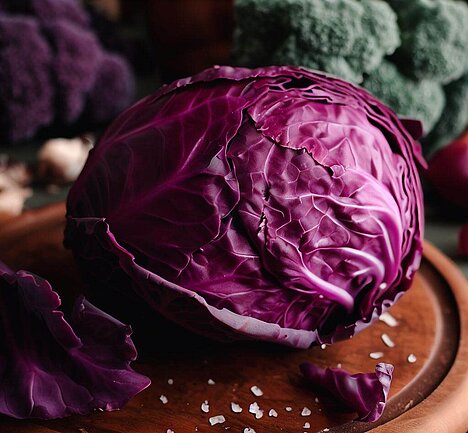Red cabbage

What is red cabbage?
Red cabbage, also known as red cabbage or red cabbage, is a type of cabbage that belongs to the cruciferous family. It has a round head with dark red to purple leaves that are firmly joined together. It tastes sweet and sour and is usually cooked or prepared as a salad.
Red cabbage is rich in vitamins, minerals and antioxidants. Among other things, it contains vitamin C, K, B6, folic acid, potassium, iron and anthocyanins. These are responsible for the red color and have an anti-inflammatory and cancer-preventing effect.
What are the benefits of red cabbage for dogs?
Red cabbage can also be healthy for dogs if it is fed in moderation. It can boost the immune system, aid digestion and protect cellular health. It can also help to regulate the pH value of the urine and thus prevent urinary tract infections.
Red cabbage can be fed raw or cooked. However, it should only be given raw in small quantities as it can otherwise cause flatulence. When cooked, it is easier to digest and loses fewer nutrients. It can be used as a side dish with meat or as an ingredient in homemade dog food.
What are the disadvantages of red cabbage for dogs?
Red cabbage is not suitable for all dogs. It can cause gastrointestinal problems in some dogs, especially if it is fed too often or too much. It can also affect thyroid function as it contains goitrogens. These are substances that inhibit the absorption of iodine and can therefore lead to hypothyroidism.
Red cabbage should therefore not be fed to dogs with thyroid problems or iodine deficiency. It should also not be combined with other goitrogenic foods such as soy or rapeseed.
Red cabbage is a healthy vegetable that can also have benefits for dogs.
If you notice any signs of hypersensitivity or poisoning in your dog, you should see your vet immediately. We are not a substitute for a vet, but we try to be as accurate as possible. Every dog reacts differently and we recommend you get a second opinion or consult your vet if in doubt.
Stay healthy and take good care of your four-legged friend!😊